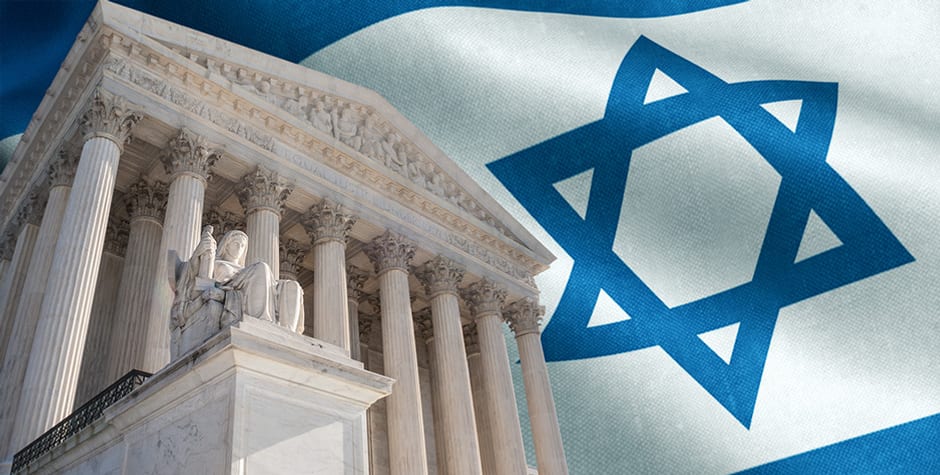ACLJ Urges Supreme Court To Hold the PLO, Palestinian Authority, and Other Funders of Terrorism Against Israel Accountable
Listen tothis article
The ACLJ defends Israel in courts all around the world. In a critical amicus brief filed with the U.S. Supreme Court, we urged the Court to keep American courts open to those who have been harmed by terrorists. By filing this brief, we stand firmly with victims of terrorism, urging the Court to hold the Palestine Liberation Organization (PLO) and Palestinian Authority (PA) accountable for their ongoing support of terrorist activities that harm American citizens.
The Taylor Force Act stands as a critical legislative milestone in America’s fight against terrorist financing, named in honor of Taylor Force, a brave U.S. Army veteran who was brutally murdered by a Palestinian terrorist in Israel. This landmark legislation targeted the Palestinian Authority’s deeply disturbing practice of providing financial rewards to terrorists and their families – a reprehensible policy that incentivizes violence against Americans and Israelis. By imposing strict conditions on U.S. economic assistance to the PA, the act ensures that American taxpayer dollars are not indirectly supporting terrorism, cutting off funding when the PA continues its “pay-to-slay” program that provides salaries to individuals imprisoned for terrorist acts. The ACLJ is proud to support this act. We also filed a FOIA lawsuit against the Biden Administration over its willful violation of the act.
To further implement and enforce the Taylor Force Act, Congress passed, and President Trump signed during his first term, the Promoting Security and Justice for Victims of Terrorism Act (PSJVTA). This law represents a powerful legislative tool in our nation’s ongoing battle against international terrorism and was crafted with precision to provide American victims with a clear path to justice. It creates a robust legal mechanism that enables victims of terrorist attacks to hold organizations accountable for their direct and indirect support of terrorism, specifically targeting entities like the PLO and PA. Congress said specifically that if the PLO and PA choose to continue to violate the Taylor Force Act and fund terrorism, as well as operate and fundraise in the United States, that conduct would be deemed implicit consent to participate in legal proceedings. Congress enacted this law to provide meaningful avenues for victims to seek compensation and hold responsible parties accountable, demonstrating our unwavering commitment to protecting American lives and defending justice on the global stage. The PLO and PA could still show up and defend themselves, but what they could not do is avoid the court system altogether.
But the Second Circuit Court of Appeals ruled in this case that this law is unconstitutional and violates the so-called due process rights of the PLO and PA. The Second Circuit’s decision represents a deeply troubling judicial obstruction of justice, effectively shielding terrorist-supporting organizations from accountability and undermining congressional efforts to protect American lives.
In a misguided ruling, the court manufactured a novel and unprecedented “reciprocal benefit” requirement for personal jurisdiction, creating a legal barrier that prevents victims of terrorism from seeking justice in American courts. By demanding a “benefit” to the defendants before allowing jurisdiction – a requirement found nowhere in existing Supreme Court precedent – the Second Circuit essentially created a legal shield for organizations that finance terrorism, directly contradicting Congress’s clear legislative intent to provide a path to justice for victims.
We just filed a major amicus brief at the Supreme Court in Fuld v. PLO and United States v. PLO. Our brief focuses on a fundamental principle: When organizations knowingly support terrorism against Americans, they should face legal consequences in U.S. courts. The PSJVTA, rather than being unconstitutional, is an appropriate exercise of Congress’ authority. For personal jurisdiction to violate due process, the lawsuit must “offend ‘traditional notions of fair play and substantial justice.’” Int’l Shoe Co. v. Washington, 326 U.S. 310, 316 (1945). Holding the PLO and PA accountable in American courts does not pose any risk to fair play. Instead, it is a basic measure of national security.
Congress passed a law providing that if the PLO and PA continued to engage in this conduct, they would face consequences. They never stopped. The organizations admittedly continue making these payments despite clear congressional notice that doing so would subject them to American courts. Our brief emphasized that the PLO and PA have even expressly admitted to the Supreme Court that they have made payments to terrorists who killed or injured Americans in the past and that they intend to do so in the future. They purport to justify those payments under their “laws” as a purported country that the United States does not recognize; regardless, the terroristic murder of Americans remains a crime under American law for which Congress can enact consequences.
Our brief urged the Supreme Court to hold the PLO and PA accountable:
The idea that Congress must bargain with terrorists by giving them “governmental benefit[s]” to obtain their willingness to subject themselves to the jurisdiction of federal courts is incongruous and absurd. It has no place in the law. If the PLO and PA choose[] to continue making these odious payments, thus encouraging more terrorist attacks and putting more Americans at risk, then under the PSJVTA it may be sued in U.S. courts. No due process concern with “fair play” is threatened by such a conclusion.
This case represents more than a legal dispute – it’s about protecting American lives and sending a clear message that those who support terrorism will be held accountable. The ACLJ remains committed to defending liberty, pursuing justice, and protecting the fundamental rights of Americans both at home and abroad.
